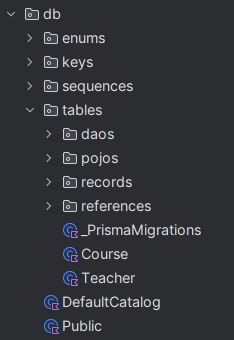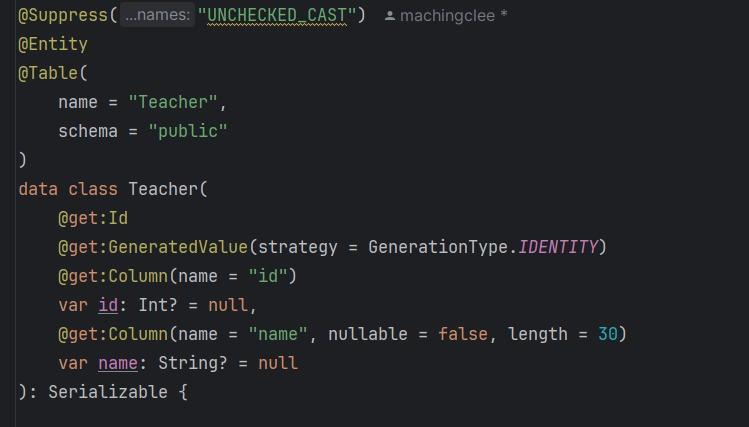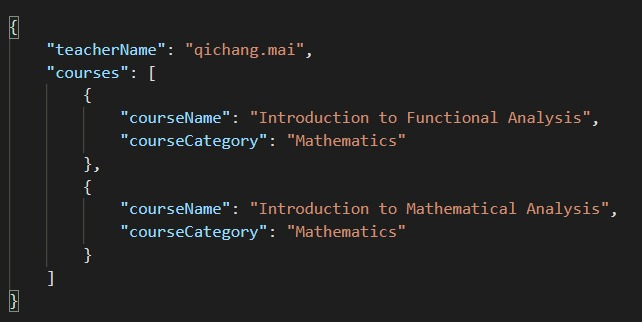build.gradle.kt
In Spring Initializr choose gradle-kotin, kotlin, and choose whatever starter-project that you have seen in the implementation part of the gradle file, namely:
implementation("org.springframework.boot:spring-boot-starter-data-jpa") implementation("org.springframework.boot:spring-boot-starter-jooq") implementation("org.springframework.boot:spring-boot-starter-validation") implementation("org.springframework.boot:spring-boot-starter-web")
The complete gradle file is as follow:
import org.jooq.meta.jaxb.* import org.jooq.codegen.GenerationTool import org.jooq.meta.jaxb.Target val jooqVersion = "3.19.9" val srcPackage = "com.<company-name>.infrastructure" group = "com.<company-name>.infrastructure" version = "0.0.1-SNAPSHOT" buildscript { val jooqVersion = "3.19.9" repositories { mavenCentral() } dependencies { classpath("org.jooq:jooq-codegen:$jooqVersion") classpath("org.postgresql:postgresql:42.3.5") } } repositories { google() mavenCentral() } plugins { id("org.springframework.boot") version "3.3.0" id("io.spring.dependency-management") version "1.1.5" kotlin("plugin.jpa") version "1.9.24" kotlin("jvm") version "1.9.24" kotlin("plugin.spring") version "1.9.24" } java { toolchain { languageVersion = JavaLanguageVersion.of(21) } } repositories { mavenCentral() } dependencies { compileOnly("org.jooq:jooq:$jooqVersion") compileOnly("org.jooq:jooq-codegen:$jooqVersion") runtimeOnly("org.postgresql:postgresql:42.3.5") implementation("org.springframework.boot:spring-boot-starter-data-jpa") implementation("org.springframework.boot:spring-boot-starter-jooq") implementation("org.springframework.boot:spring-boot-starter-validation") implementation("org.springframework.boot:spring-boot-starter-web") implementation("com.fasterxml.jackson.module:jackson-module-kotlin") implementation("org.jetbrains.kotlin:kotlin-reflect") implementation("io.github.oshai:kotlin-logging-jvm:5.1.0") testImplementation("org.springframework.boot:spring-boot-starter-test") testImplementation("org.springframework.boot:spring-boot-starter-webflux") testImplementation("org.jetbrains.kotlin:kotlin-test-junit5") testRuntimeOnly("org.junit.platform:junit-platform-launcher") testImplementation("io.mockk:mockk:1.13.11") testImplementation("com.ninja-squad:springmockk:4.0.2") // testImplementation("io.projectreactor:reactor-test") } tasks.create("generate") { println(projectDir.toString() + "main/kotlin") GenerationTool.generate( Configuration() .withJdbc( Jdbc() .withDriver("org.postgresql.Driver") .withUrl("jdbc:postgresql://localhost:5432/pgdb") .withUser("pguser") .withPassword("pguser") ) .withGenerator( Generator() .withName("org.jooq.codegen.KotlinGenerator") .withDatabase(Database().withInputSchema("public")) .withGenerate( Generate() .withPojos(true) .withDaos(true) .withSpringAnnotations(true) .withJpaAnnotations(true) .withKotlinNotNullPojoAttributes(true) .withKotlinDefaultedNullablePojoAttributes(true) ) .withTarget( Target() .withPackageName("$srcPackage.db") .withDirectory("$projectDir/src/main/kotlin") ) ) ) } kotlin { compilerOptions { freeCompilerArgs.addAll("-Xjsr305=strict") } } tasks.withType<Test> { useJUnitPlatform() } sourceSets { test { java { setSrcDirs(listOf("src/test/integration", "src/test/unit")) } } }
Installation of Gradle and a few Commands
-
First install
Javaif you haven't: -
Install
gradle, for windows we can execute the following in powershell:choco install gradle -
Note that the installation of
gradleis not compulsory, alternatively we can rungradleinside the spring boot project by/gradlew -q :<the-command>For example, the following are equivalent:
./gradlew -q :tasks --all gradle tasks --all # in case you have gradle installed -
Suppose that you have a working database in
dev, simply run./gradlew -q :generate gradle generateto generate code in kotlin. Where
generateis a task defined intasks.create("generate") { ... }insidebuild.gradle.kt. -
Clear resinstall all dependencies:
gradle build --refresh-dependencies
Prisma and JOOQ
The Simple Schema
datasource db { provider = "postgresql" url = env("DATABASE_URL") } model Course { id String @id @default(dbgenerated("gen_random_uuid()")) @db.Uuid name String category String Teacher Teacher? @relation(fields: [teacherId], references: [id]) teacherId Int? approvalStatus CourseApprovalStatus @default(PENDING) } enum CourseApprovalStatus { PENDING APPROVED } model Teacher { id Int @id @default(autoincrement()) name String Course Course[] }
JOOQ Code Generation and JPA Annotation for Data Validation
After we have executed gradle generate, the following will be generated:

In case you are curious about the detail inside the files, see this link
- Here
Pojos are used to communicated withDAOs - We can make use of
DAO's to perform very simple and basicCRUD. - For complicated query we make use of classes inside
references/{Course, Teacher}in the next section
The resulting geneated POJO is of the form:

Data Persistence with DAO.insert() or db.insertInto()
Consider the folloing CourseService class:
@Service class CourseService( val db: DSLContext, val courseRepository: CourseRepository ) { companion object { var logger: KLogger = KotlinLogging.logger {} } fun addCourse(courseDTO: CourseDTO): CourseDTO? { val course = Course() course.name = courseDTO.name course.category = courseDTO.category course.approvalstatus = courseDTO.approvalStatus val courseEntity = courseRepository.save(course) logger.info { "Save Course is $courseEntity" } return if (courseEntity != null) { CourseDTO(courseEntity.id!!, courseEntity.name!!, courseEntity.category!!, courseEntity.approvalstatus!!) } else { null; } } ... }
Here courseRepository.save(course) can be implemented in two ways:
@Repository class CourseRepository( private val db: DSLContext, private val courseDao: CourseDao ) { fun save(course: Course): Course? { // or simply courseDao.insert(course) val result = db.insertInto(COURSE, COURSE.NAME, COURSE.CATEGORY, COURSE.APPROVALSTATUS) .values(course.name, course.category, course.approvalstatus) .returning() .fetchOneInto(Course::class.java) return result } }
Unfortunately the DAO.insert() method cannot return anything just saved (like the id). We are forced to use db.insertInto in case we need it.
Query by Autogeneated Reference Table Object
@Service class CourseService( val db: DSLContext, val courseRepository: CourseRepository ) { companion object { var logger: KLogger = KotlinLogging.logger {} } ... // for nested records // https://www.jooq.org/doc/latest/manual/sql-building/column-expressions/nested-records/ // https://blog.jooq.org/jooq-3-15s-new-multiset-operator-will-change-how-you-think-about-sql/ // https://stackoverflow.com/questions/32332729/jooq-query-with-nested-list // https://www.jooq.org/doc/latest/manual/sql-building/column-expressions/multiset-value-constructor/ // https://www.jooq.org/doc/latest/manual/sql-execution/fetching/ad-hoc-converter/ // for transaction: https://www.jooq.org/doc/latest/manual/sql-execution/transaction-management/ fun getTeachers(teacherId: Int): TeacherDetail? { val courseResult = db .select( TEACHER.NAME.`as`("teacherName"), multiset( select( COURSE.NAME.`as`("courseName"), COURSE.CATEGORY.`as`("courseCategory") ) .from(COURSE) .where(COURSE.TEACHERID.eq(TEACHER.ID)) ).`as`("courses").convertFrom { it.into(CourseDetail::class.java) } ) .from(TEACHER) .where(TEACHER.ID.eq(teacherId)) .fetchOneInto(TeacherDetail::class.java) return courseResult } }
The direct output in postman becomes

Tests
Integration Test
package com.kotlinspring.controller import com.kotlinspring.config.DSLContextConfig import com.kotlinspring.db.enums.Courseapprovalstatus import com.kotlinspring.db.tables.daos.CourseDao import com.kotlinspring.dto.CourseDTO import com.kotlinspring.repository.CourseRepository import com.kotlinspring.service.CourseService import org.junit.jupiter.api.Assertions import org.junit.jupiter.api.Test import org.springframework.beans.factory.annotation.Autowired import org.springframework.boot.test.autoconfigure.web.reactive.WebFluxTest import org.springframework.context.annotation.Import import org.springframework.test.context.ActiveProfiles import org.springframework.test.context.ContextConfiguration import org.springframework.test.web.reactive.server.WebTestClient @WebFluxTest @ActiveProfiles("default", "test") @ContextConfiguration(classes = [DSLContextConfig::class]) @Import(CourseController::class, CourseService::class, CourseRepository::class, CourseDao::class) class CourseControllerIntegrationTest { @Autowired lateinit var webTestClient: WebTestClient @Test fun addCourse() { val courseDTO = CourseDTO(null, "Build Nice Course", "James Lee", Courseapprovalstatus.APPROVED) val savedCourseDTO = webTestClient.post().uri("/v1/courses") .bodyValue(courseDTO) .exchange() .expectStatus().isCreated .expectBody(CourseDTO::class.java) .returnResult() .responseBody Assertions.assertTrue { savedCourseDTO!!.id != null } Assertions.assertTrue { savedCourseDTO!!.approvalStatus == Courseapprovalstatus.APPROVED } Assertions.assertTrue { savedCourseDTO!!.approvalStatus != Courseapprovalstatus.PENDING } } }
On test succeeds:

Unit Test (with Mocking)
package com.kotlinspring.controller import com.kotlinspring.data.CourseDetail import com.kotlinspring.data.TeacherDetail import com.kotlinspring.dto.GetTeacherResponseDTO import com.kotlinspring.service.CourseService import com.ninjasquad.springmockk.MockkBean import io.mockk.every import org.junit.jupiter.api.Assertions import org.junit.jupiter.api.Test import org.springframework.beans.factory.annotation.Autowired import org.springframework.boot.test.autoconfigure.web.reactive.AutoConfigureWebTestClient import org.springframework.boot.test.autoconfigure.web.servlet.WebMvcTest import org.springframework.test.web.reactive.server.WebTestClient @WebMvcTest(controllers = [CourseController::class]) @AutoConfigureWebTestClient class CourseControllerUnitTest( @Autowired var webTestClient: WebTestClient ) { @MockkBean lateinit var courseServiceMock: CourseService @Test fun getTeachers() { val name = "James Lee" every { courseServiceMock.getTeachers(any()) } returns TeacherDetail("James", listOf<CourseDetail>()) val result = webTestClient.get().uri("/v1/teachers/${1}") .exchange() .expectStatus().is2xxSuccessful .expectBody(GetTeacherResponseDTO::class.java) .returnResult() .responseBody Assertions.assertTrue { result?.numOfClass == 0 } } }
Note that we have intentionally make some operation after courseServiceMock.getTeachers in the courseController, see here for detail.